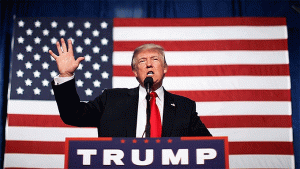The 45ᵗʰ US President In His Own Words

Donald Trump. Picture: Chip Somodevilla/Getty
In The Art of the Deal, first published in 1987, Donald Trump, the 45th president of the United States of America, sums up his modus operandi: “My style of deal-making is quite simple and straightforward. I aim very high, and then I just keep pushing and pushing and pushing to get what I’m after. Sometimes I settle for less than I sought, but in most cases I still end up with what I want.”
The self-proclaimed master negotiator now promises to bend the Chinese to his will and deport some eleven million illegal immigrants. He’ll probably settle for a few million – give or take. In the Trump Era that got underway with Friday’s inauguration, nothing is quite what it seems. Thankfully, perhaps, the new US president is a pragmatist who will ask for the moon, but take whatever deal he can realistically obtain. As such, his boisterous proclamations and bluster need to be seen for what they are: opening bids that do not represent real value. The price or cost is only determined once a deal is reached. It is good to remember who President Trump is first and foremost: a shrewd businessman and dealmaker.
“My style of deal-making is quite simple and straightforward. I aim very high, and then I just keep pushing and pushing and pushing to get what I’m after. Sometimes I settle for less than I sought, but in most cases I still end up with what I want.”
In his best-selling book – erroneously touted as the most-sold business book of all times – President Trump states that he never gets too attached to a single deal or approach. This explains how he started out as a Democrat in 1990, became a Republican nine years later, returned to the Democrat fold in 2004, and ended up back in the GOP in 2015. Last year, while on the campaign stump, Mr Trump settled the question: “Folks, I’m a conservative, but at this point, who cares?”
In a negotiation, everything is up for grabs: should pro-choice prove an inconvenience, try pro-life instead and see how that works out. Beliefs are mere bargaining chips, thrown in to exact concessions. Here’s a wisdom from The Art of the Deal that could be of interest to Prime Minister Theresa May: “The worst thing you can possibly do in a deal is seem desperate to make it. That makes the other guy smell blood, and then you’re dead.”
An experienced practitioner of what he calls “truthful hyperbole”, President Trump knows how to manipulate his opponents: “I play to people’s fantasies. A little hyperbole never hurts. People want to believe that something is the biggest and the greatest and the most spectacular.”
Make America Great Again! Build the Best Wall! Hispanics Love Me! No-one Respects Women More Than I Do! I’m Richer Than Anyone Can Believe! I’m the Greatest! I’m the Smartest!
In fact, Mr Trump is so smart that he has scant use for experts and their opinions: “I don’t hire a lot of number-crunchers, and I don’t trust fancy marketing surveys. I do my own surveys and draw my own conclusions.” Still, the man is not a fool and recognises the perils of not delivering the goods: “You can’t con people, at least not for long. You can create excitement, you can do wonderful promotion, you can get all kinds of press, but if you don’t deliver the goods, people will eventually catch on.”
As Hillary Clinton found out to her detriment, Donald Trump knows how to play the media too: “Most reporters, I find, have very little interest in exploring the substance of a detailed proposal for a development. They look instead for the sensational angle.” Always ready to provide fireworks on demand, Mr Trump makes sure that the papers write about him and the cameras keep rolling to record his every move, adhering to the maxim that any press is always better than none. Taking this yet another step further, Mr Trump in 1991 confided to Esquire Magazine that it doesn’t really matter what the media write as long as you’ve got a “young and beautiful piece of [expletive] at your side.”
Connecting seamlessly to the man or woman on the street who has no time for subtleties, Mr Trump champions simple yet effective solutions to complex problems. In 2015, Mr Trump suggested on CNN that were he president, the might of the US Airforce would be unleashed on the oilfields that provide ISIS with ready cash: “You just knock the hell out of oil and take it back – all of it – and use the proceeds to care for veterans. We’re going to have so much money!” In the same interview, Mr Trump also said that his approach would do away with the need to provide a large number of ground troops: “By the time I am finished, you wouldn’t need ‘em.”
Still, President Trump is not all about high noon at OK Corral. In fact, he considers waging war the pursuit of losers and would much rather defeat antagonists at the negotiating table. The world may feel like it is moving perilously close to the edge, President Trump seems unfazed and will call anyone’s bluff. The larger question is: what will he do when someone calls his?
You may have an interest in also reading…
Ann Low, National Defense University: Excellence in Government through User-Centric Design
Around the world a revolution is occurring, not one of violent upheaval, but one of excellence. Estonia and New Zealand
Evan Harvey, Nasdaq: Medium Is the Message – ESG Delivery and Market Distrust
Despite cultural assumptions surrounding content and interpretation, we tend to believe that the way we communicate is meaningful. “In operational
U.S. Trade Deficit and Consumer Sentiment Rise
The United States trade deficit widened in November to its largest point in five months, prompting some economists to slightly

















































































